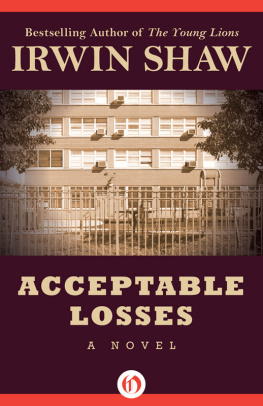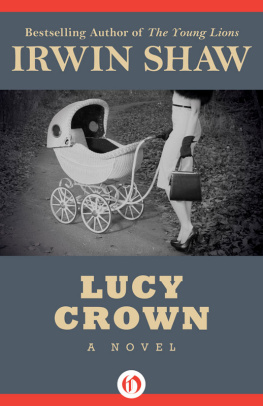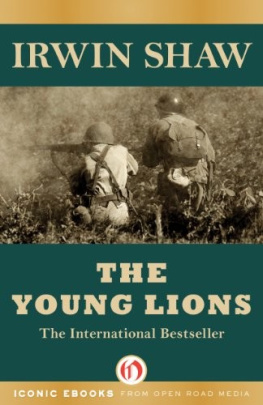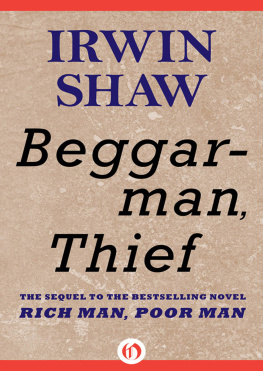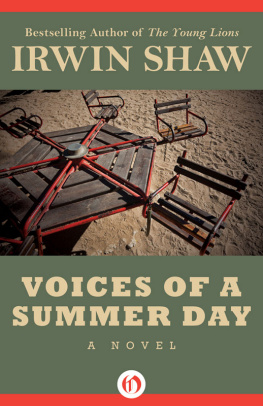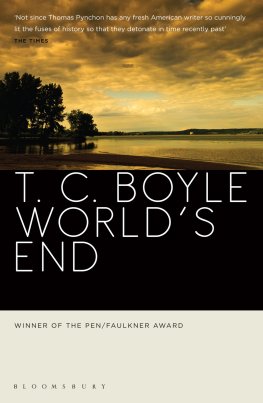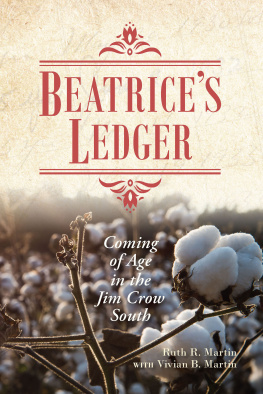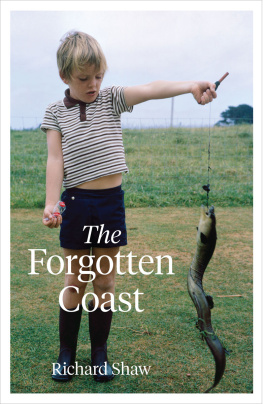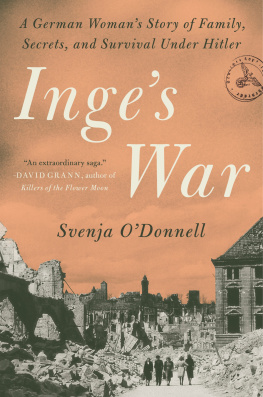Rich Man, Poor Man
and
Beggarman, Thief
Irwin Shaw

Contents
Rich Man, Poor Man
PART ONE
CHAPTER 1
CHAPTER 2
CHAPTER 3
CHAPTER 4
CHAPTER 5
CHAPTER 6
CHAPTER 7
CHAPTER 8
CHAPTER 9
CHAPTER 10
CHAPTER 11
PART TWO
CHAPTER 1
CHAPTER 2
CHAPTER 3
CHAPTER 4
CHAPTER 5
CHAPTER 6
CHAPTER 7
PART THREE
CHAPTER 1
CHAPTER 2
CHAPTER 3
CHAPTER 4
CHAPTER 5
CHAPTER 6
CHAPTER 7
PART FOUR
CHAPTER 1
CHAPTER 2
CHAPTER 3
CHAPTER 4
CHAPTER 5
CHAPTER 6
CHAPTER 7
Beggarman, Thief
VOLUME: ONE
CHAPTER 1
CHAPTER 2
CHAPTER 3
CHAPTER 4
CHAPTER 5
CHAPTER 6
CHAPTER 7
CHAPTER 8
VOLUME: TWO
CHAPTER 1
CHAPTER 2
CHAPTER 3
CHAPTER 4
VOLUME: THREE
CHAPTER 1
CHAPTER 2
CHAPTER 3
CHAPTER 4
CHAPTER 5
CHAPTER 6
CHAPTER 7
CHAPTER 8
CHAPTER 9
CHAPTER 10
CHAPTER 11
VOLUME: FOUR
CHAPTER 1
A Biography of Irwin Shaw

Rich Man, Poor Man
Irwin Shaw

CONTENTS
PART ONE
CHAPTER 1
CHAPTER 2
CHAPTER 3
CHAPTER 4
CHAPTER 5
CHAPTER 6
CHAPTER 7
CHAPTER 8
CHAPTER 9
CHAPTER 10
CHAPTER 11
PART TWO
CHAPTER 1
CHAPTER 2
CHAPTER 3
CHAPTER 4
CHAPTER 5
CHAPTER 6
CHAPTER 7
PART THREE
CHAPTER 1
CHAPTER 2
CHAPTER 3
CHAPTER 4
CHAPTER 5
CHAPTER 6
CHAPTER 7
PART FOUR
CHAPTER 1
CHAPTER 2
CHAPTER 3
CHAPTER 4
CHAPTER 5
CHAPTER 6
CHAPTER 7
Many thanks to my editor, Kathy Anderson, for her invaluable assistance and advice.
To My Son
PART

ONE
CHAPTER 1

1945
I
Mr. Donnelly, the track coach, ended the days practice early because Henry Fullers father came down to the high-school field to tell Henry that they had just got a telegram from Washington announcing that Henrys brother had been killed in action in Germany. Henry was the teams best shot-putter. Mr. Donnelly gave Henry a chance to go in and change his clothes alone and go home with his father, then whistled to gather the whole squad in a group and said they could all go home, as a gesture of respect.
The baseball team was practicing on the diamond, but nobody on the baseball team had lost a brother that afternoon, so they kept on practicing.
Rudolph Jordache (two-twenty low hurdles) went into the locker room and took a shower, although he hadnt run enough to work up a sweat. There never was enough hot water at home and when he could he showered at the gym. The high school had been built in 1927, when everybody had money, and the showers were roomy and with plenty of hot water. There was even a swimming pool. Usually, Rudolph took a swim too, after practice, but he didnt today, out of respect.
The boys in the locker room spoke in low tones and there was none of the usual horsing around. Smiley, the captain of the team, got up on a bench and said he thought that if there was a funeral service for Henrys brother, they all ought to chip in and buy a wreath. Fifty cents a man would do it, he thought. You could tell by the looks on the boys faces who could spare the fifty cents and who couldnt. Rudolph coudnt spare it, but he made a conscious effort to look as though he could. The boys who agreed most readily were the ones whose parents took them down to New York City before the school term to buy the years clothes for them. Rudolph bought his clothes in town, in Port Philip, at Bernsteins Department Store.
He was dressed neatly, though, with a collar and tie and a sweater under a leather windbreaker, and brown pants, from an old suit whose jacket had gone through at the elbows. Henry Fuller was one of the boys who got his clothes in New York, but Rudolph was sure Henry wasnt getting any pleasure from the fact this afternoon.
Rudolph got out of the locker room quickly because he didnt want to walk home with any of the other fellows and talk about Henry Fullers brother. He wasnt particularly friendly with Henry, who was rather stupid, as the weight men were likely to be, and he preferred not to pretend to any excessive sympathy.
The school was in a residential part of the town, to the north and east of the business center, and was surrounded by semi-detached one-family houses that had been built at about the same time as the school, when the town was expanding. They were all the same originally, but through the years their owners had painted the trim and doors in different colors and here and there had added a bay window or a balcony in forlorn attempts at variety.
Carrying his books, Rudolph strode along the cracked sidewalks of the neighborhood. It was a windy early spring day, although not very cold, and he had a sense of well-being and holiday because of the light workout and the short practice. Most of the trees had already put out their leaves and there were buds everywhere.
The school was built on a hill and he could see the Hudson River below him, still looking cold and wintry, and the spires of the churches of the town, and in the distance to the south, the chimney of the Boylan Brick and Tile Works, where his sister Gretchen worked, and the tracks of the New York Central, along the river. Port Philip was not a pretty town, although once it had been, with big white Colonial houses mingled with solid Victorian stone. But the boom in the 1920s had brought a lot of new people into town, working people whose homes were narrow and dark, spreading out into all neighborhoods. Then the Depression had thrown almost everybody out of work and the jerry-built houses had been neglected, and as Rudolphs mother complained, the entire town had become a single slum. This wasnt absolutely true. The northern part of the town still had many fine big houses and wide streets and the houses had been kept up through everything. And even in the neighborhoods that were run down there were big houses that families had refused to leave and were still presentable behind generous lawns and old trees.
The war had brought prosperity once again to Port Philip and the Brick and Tile Works and the cement plant were going full blast and even the tannery and the Bye-field Shoe Factory had started up again with Army orders. But with the war on, people had other things to do than worry about keeping up appearances and, if possible, the city looked more dilapidated than ever.
With the town spread before him like that, planless and jumbled in the windy afternoon sun, Rudolph wondered if anybody would give his life to defend it or to take it, as Henry Fullers brother had given his life to take some nameless town in Germany.
Secretly, he hoped that the war would last another two years, although it didnt look now as though it would. He was going to be seventeen years old soon and another year after that he could enlist. He saw himself with a lieutenants silver bars, taking an enlisted mans salute, waving a platoon to follow him under machine-gun fire. It was the sort of experience a man ought to have. He was sorry there was no more cavalry. That must have been somethingwaving a saber, at a full gallop, charging the despicable foe.
Next page

